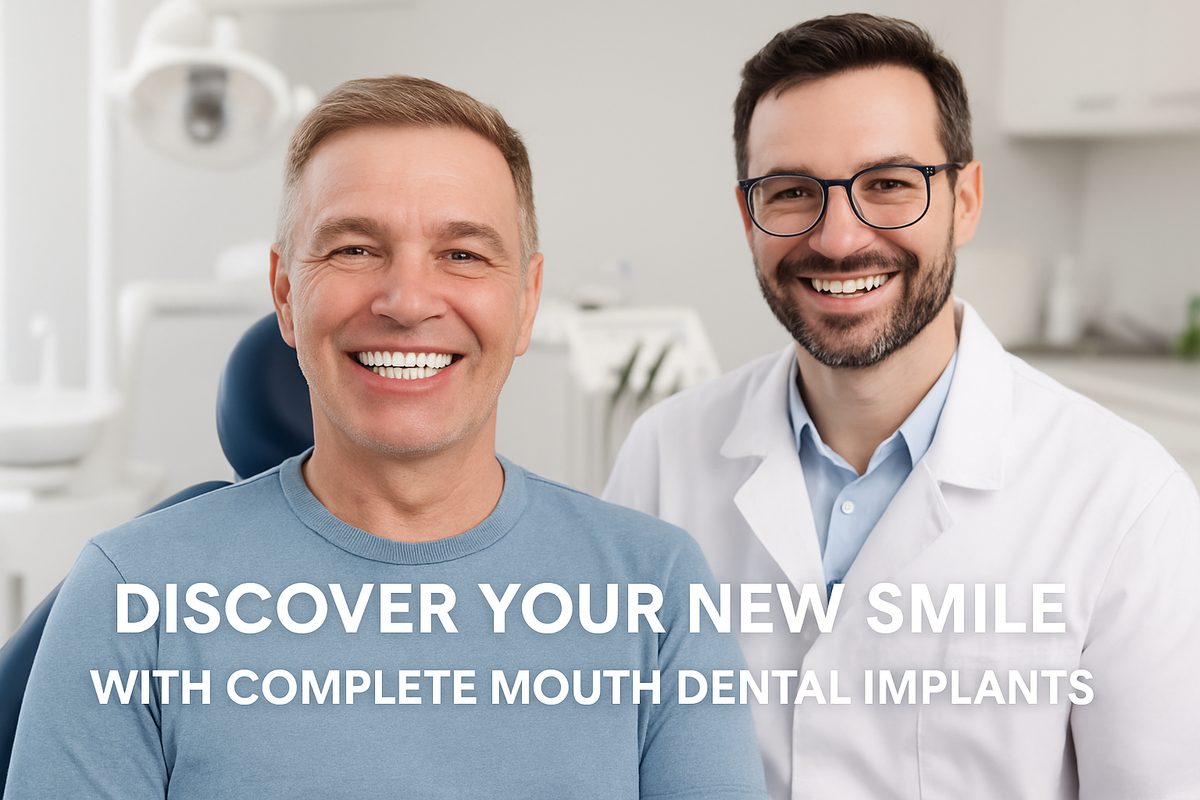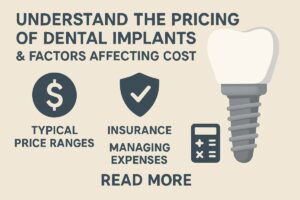Complete mouth dental implants replace most or all teeth on an upper or lower jaw using fixed implant-supported prostheses. They’re for people with many failing teeth, long-term tooth loss, or unstable dentures who want a more stable, natural-feeling solution. This article explains what complete mouth dental implants are, who qualifies, how evaluation and treatment work, benefits and risks, costs and timeline, and next steps to get started.
What are complete mouth dental implants?
Complete mouth dental implants are full-arch implant-supported bridges that anchor to dental implants placed in the jaw. Unlike removable dentures, these prostheses are fixed or removable only by a dentist and feel more like natural teeth. Common approaches include All-on-4 and multi-implant fixed bridges. Implant-retained prostheses use several implants to support a full arch, offering greater stability and bone support than traditional dentures.
Who is a candidate for complete mouth dental implants?
Extent of tooth loss
Ideal candidates have most or all teeth missing, failing teeth that are non-restorable, or chronic problems with loose dentures. People seeking a permanent, functional replacement are common candidates.
Oral and bone health
Sufficient jawbone and healthy gums help support implants. If bone volume is low, grafting or sinus lifts may be recommended before placing implants. Gum disease should be treated first to improve long-term outcomes.
Medical and lifestyle factors
General health matters: uncontrolled diabetes, certain autoimmune conditions, or heavy smoking can affect healing and implant success. Patients should have realistic expectations and commit to oral hygiene and follow-up care.
The evaluation and planning process for complete mouth dental implants
Evaluation includes medical history, clinical exam, digital scans, and CBCT imaging to map bone, nerves, and sinuses. These diagnostics guide implant number and placement and whether ceramic or metal implants suit the case. A personalized plan outlines extractions, grafting needs, and prosthetic design.
What to expect during treatment for complete mouth dental implants
Pre-surgical steps
Pre-surgical care may include removing failing teeth, treating gum disease, and placing bone grafts as needed. Healing time varies from weeks to months before implant placement.
Surgery and immediate recovery
Implant surgery is done with local anesthesia, sedation, or general anesthesia depending on complexity. Expect swelling and mild discomfort for a week or two. Short-term antibiotics and pain control are typical.
Prosthetic phase
A temporary prosthesis is often placed while implants integrate (osseointegration). Once stable, the final restoration—custom-made in an in-house lab—is attached and adjusted for fit, function, and aesthetics.
Benefits and risks of complete mouth dental implants
Benefits include improved chewing and speech, prevention of bone loss, stable esthetics, and long-term predictability. Ceramic implant options offer metal-free biocompatibility and excellent aesthetics. Risks include infection, implant failure, nerve or sinus complications, and the need for additional procedures like grafting. Proper planning and maintenance lower these risks.
Costs, timeline, and financing for complete mouth dental implants
Costs vary widely based on implant number, grafting, materials, and lab work. Treatment can take months from planning to final prosthesis. Many practices offer financing plans, third-party medical credit, and phased treatment to manage costs. Discuss options during consultation.
Why choose Dental Specialists & Implant Center for complete mouth dental implants
Dr. Adriana Wells is a board-certified periodontist with advanced implant training. The practice uses CBCT imaging, dental lasers, an in-house lab, and offers biocompatible ceramic implant options. The Woodlands, TX patients benefit from precise planning, predictable outcomes, and a spa-like, holistic care experience.
How to take the next step
Schedule a consult, bring prior x-rays and a list of medications and medical history. Expect a detailed exam, CBCT imaging, and a treatment plan with costs and timeline tailored to your needs. If you’re considering complete mouth dental implants in The Woodlands, TX, a consultation is the best first step.




